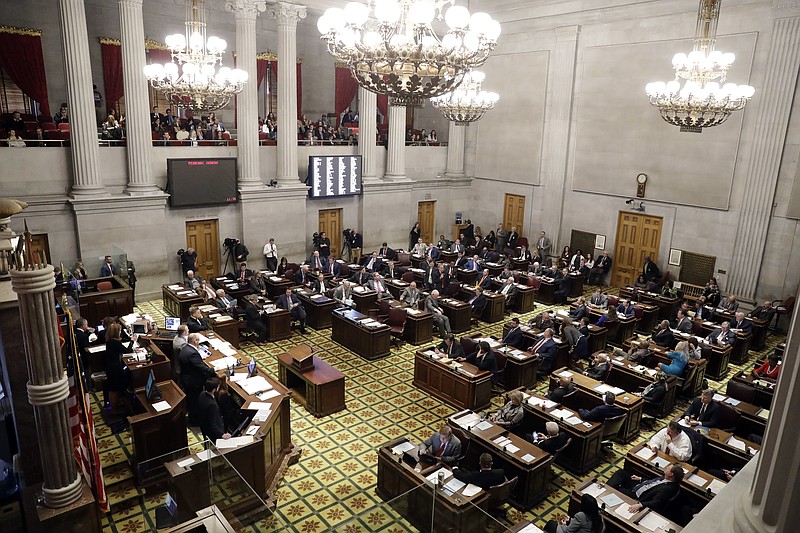NASHVILLE - Rep. Gerald McCormick, R-Chattanooga, on Wednesday pulled the plug on legislation to place new controls on local governments using tax dollars to help bankroll stadiums for professional sports teams.
McCormick said the measures drew "sudden interest" with several team owners who voiced "some legitimate concerns" on the legislation's impact on "how they run their businesses" and the proprietary information that might have to be shared.
"We want to make sure we get the language right before we run the bill," the lawmaker added. "If there were, for instance, a Major League Baseball team looking at Tennessee, we wouldn't want them to look at this bill and have that be a deciding factor in going to another state."
Meanwhile, another Hamilton County legislator, Rep. Mike Carter, R-Ooltewah, gave up on his two-year battle for a bill that sought to allow disgruntled residents in some areas of Tennessee cities to vote to secede.
After taking the bill off notice, Carter blasted lobbyists for municipalities.
"I didn't have the votes," Carter said of the bill that had been scheduled for hearing in the House Local Government Subcommittee. "Citizens united together from home is wonderful, but it can't overcome hundreds of thousands of dollars and lobbyists making threats against standing members."
He voted to come back with it next year.
Earlier this year, McCormick introduced two bills dealing with cities' efforts to lure or keep pro sports teams. Last week, McCormick shelved one concept that would have required non-binding public referendum votes approving such municipal agreements with the teams. And it barred taxpayer support for actual stadium construction.
He was looking at major surgery with new provisions that would have brought the state comptroller's office into the process to ensure cities and taxpayers wouldn't be harmed by agreements.
McCormick said at this point he wants to make "certain that we don't make a mistake by going too fast, and I think we can wait a year and work on it again next year."
His intent, McCormick has said, is to ensure that when public obligations are made on such deals they will result in taxpayers "getting a fair shake."
The lawmaker introduced the legislation this year amid public discussion involving the possible relocation of the Chattanooga Lookouts to the 141-acre U.S. Pipe/Wheland Foundry site located in the South Broad District.
Property owners are eyeing the site as a sports and entertainment venue, and Chattanooga Lookouts baseball team owners are interested in relocating there. They are likely to seek government assistance.
Mike Mallen, a member of the foundry ownership group, said last month the Wheland/U.S. Pipe site qualifies for brownfield tax increment financing (TIF), a tool that could be used to help spur development in the area.
In TIF districts, local governments commit to support major projects using increases in taxes generated by new development to pay off bonded indebtedness on investments in streets, parks and other such improvements.
Nashville has used similar financing to back major stadium projects that resulted in the NFL's Houston Oilers relocating to Nashville, where they are now the Tennessee Titans, as well as a group of Tennessee businessmen getting awarded a Major League Soccer team franchise in December.
With regard to the fate of Carter's de-annexation bill, Sen. Bo Watson, R-Hixson, last year passed a watered-down version of the measure in the Senate as towns and cities and their association, the Tennessee Municipal League, fought it.
It allowed disgruntled residents of areas annexed since 1998 to vote in a referendum to leave a municipality. But the bill also had requirements that the residents continue paying some taxes with regard to bonded indebtedness incurred by the municipality when they were still living there.
In 2014, Carter and Watson upended decades-old Tennessee municipal annexation law by barring cities and towns from acquiring new territory by ordinance.
The now-dead de-annexation measure was intended as a follow up.
"Today, the farmers and the people of Tennessee were denied their right to vote," said Carter, who intends to push the issue next year when the new 110th General Assembly takes office.
He thanked two of the subcommittee's members, Rep. Dan Howell, R-Georgetown, and Rep. Tim Wirgau, R-Buchanan, for their support.
Contact Andy Sher at asher@timesfreepress.com or 615-255-0550. Follow him on Twitter @AndySher1.


